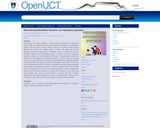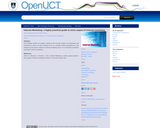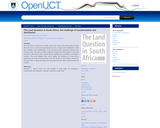
Note: This book was written in 1999 and last updated in 2003. Since then technologies have changed so the non-conceptual and more technical parts of the book may be out of date.Why Yet Another Textbook (WYAT)?There are many excellent introductory information systems (IS) texts on the market. Why then produce our own text? Interestingly enough, when we sat down to critically review the first year Information Systems curriculum, the very last thing that we wanted was to get involved in writing yet another text. But after we had set the broad educational goals, the curriculum content and educational approach, we found that no textbook fitted our objectives or approach. Briefly, the following considerations forced us to fire up our word processor and compile the text you find in front of you.Technology Bias. A frequent criticism of the introductory information systems curricula is that many have a very strong technological bias: many courses are an in-depth treatment of hardware and software concepts with an avalanche of buzzwords, often reflecting some computer science origins. Although a sound understanding of the technology that underlies information systems is critical, this technology is subject to significant change and seems to receive a disproportionately large amount of attention. This is particularly prevalent in many of the American textbooks that we considered for this course: they all seem to be an "Introduction to Computers" rather than an "Introduction to Information Systems". We wondered where the broader scientific contexts are in these, admittedly very well illustrated but quickly out-dated, documentaries of computer technologies. This is in sharp contrast to a number of European and Australasian texts, some of which relegate all the technology concepts to a single chapter or even a mere appendix at the end of the book! We needed something of a balance between these two extremes. We hope that the three roughly equal sections (scientific, technological and organisational contexts) in this will provide a sufficiently balanced approach to the study of information systems. We wish to provide students with a sound technical understanding but also let them take into account the more philosophical, scientific and organisational aspects of information systems.Depth of Treatment. We needed a text where the conceptual or theoretical component would be equivalent to roughly half of a one-semester course. Most textbooks on the market are intended for full or half-year courses. A frequent comment, even of the newer "trimmed-down editions", is that there is just too much material. Students with little or no previous exposure to computer jargon especially despair when confronted with the many new terms and acronyms. In addition, many of these technologies may be outdated by the time the students have completed their studies. By limiting ourselves to twelve chapters and setting strict limits to the length of each chapter, we hope to stem the "information overload" without compromising the academic standard. We carefully considered "need to know" versus "nice to know". A good example of the latter are the typical detailed historical notes on historical devices such as the abacus, Babbage or ENIAC.Educational Approach. Contrary to our expectations, past student evaluations showed that the textbook previously use, a well-written American one with excellent colour photographs and illustrations, was not well received and lectures based on the textbook were judged to be "boring". It is clear that a different educational approach was needed, perhaps due to our unique South African circumstances. Based on our experiences, we hope that a participatory learning approach will make the "theoretical" section come more alive and replace the rote learning with genuine understanding. The integral part of this text is therefore in the supporting materials: readings, case studies, class assignments and group exercises.Cost. Although not a decisive factor, we also considered the fact that many students face financial constraints. By producing a local textbook, we hope to beat the exchange rate fluctuations.This text consist of twelve chapters, which can be grouped roughly into the following three sections.The scientific context: a review of the fundamental scientific concepts on which IS builds: what is information, what is a system and what are information systems.The technological context: an overview of relevant technology: hardware, software and communications technology.The organisational context: the development and deployment of information systems as well as some wider societal concerns.It is important that this text not be seen separate from the practical worksheets, case studies, videos and group work, which will be provided in the lectures. The intention of these additional materials is to enhance the educational process through participatory learning units: you learn best when doing.It is also our conviction that university students need to be introduced from the first year to academic pluralism: too often undergraduate students get the impression that there is a single correct approach or, even worse, that most problems have only one correct solution or answer. This text is therefor supplemented with additional readings, culled from the world-wide web, in which we hope to expose students to different views of the material presented in the concepts part.
- Subject:
- Applied Science
- Computer Science
- Material Type:
- Case Study
- Textbook
- Provider:
- University of Cape Town
- Provider Set:
- UCT OpenContent
- Author:
- Jean-Paul Van Belle Jane Nash & Mike Eccles
- Date Added:
- 03/07/2019

